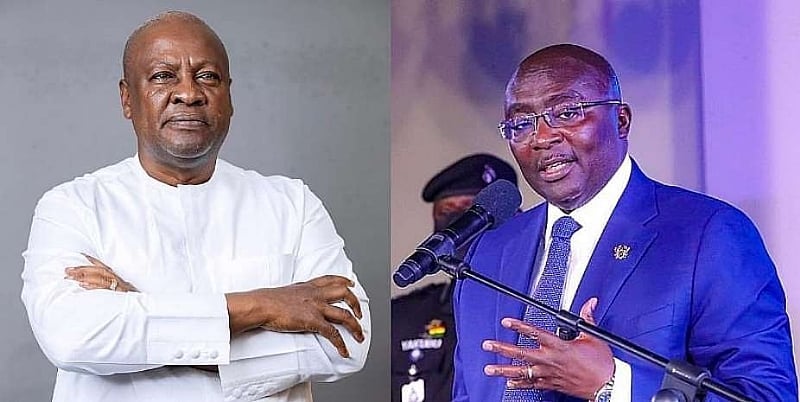In a recent exchange of criticisms regarding Ghana’s economy, Dr. Mahamudu Bawumia, the New Patriotic Party (NPP) flagbearer, responded to former President John Dramani Mahama’s accusations with a detailed rebuttal on social media. Mahama had earlier posed five key questions related to economic issues such as Ghana’s exchange rate, mounting public debt, inflation, and fiscal management, all of which he attributed to the current government’s perceived failings. Specifically, Mahama highlighted the drastic depreciation of the cedi, which has shifted from GH₵4 to almost GH₵17 per dollar between 2016 and 2024, alongside the significant increase in national debt from GH₵120 billion to GH₵763 billion during Bawumia’s tenure as Chair of the Economic Management Team (EMT). Mahama characterized these transformations as evidence of economic mismanagement under the NPP.
In his response, Dr. Bawumia dismissed Mahama’s inquiries as “flimsy” and argued that the former president was dodging a more direct confrontation of ideas by not engaging in a one-on-one debate about their respective records and future visions for Ghana. Bawumia invited Mahama to discuss these topics publicly, offering to allow moderators to pose Mahama’s original questions while also asserting that he had significantly more substantial queries to direct at Mahama. By presenting a list of 50 pointed questions, Bawumia sought to redirect the conversation toward perceived deficiencies in Mahama’s administration and policy decisions during his presidency, further asserting the efficacy of NPP governance.
Bawumia’s 50 questions covered a wide spectrum of issues including social and economic policies, job creation, infrastructure development, and the management of key public sectors such as health and education. For instance, he asked Mahama to outline any significant social intervention policies enacted during his presidency and questioned the rationale behind Mahama’s opposition to the NPP’s flagship “Free Senior High School” initiative. The intent behind these questions was clear: Bawumia aimed to highlight what he regards as the failures of Mahama’s administration compared to the accomplishments of the current NPP government.
Moreover, Bawumia’s queries delved into infrastructure achievements, such as road and hospital construction, positioning NPP’s efforts favorably against those of Mahama’s government. He asked Mahama to explain why the NPP government has reportedly constructed more roads and healthcare facilities than were built during Mahama’s tenure, suggesting that the current administration’s commitment to national development starkly contrasts with what he perceives as Mahama’s shortcomings in infrastructure strategy and implementation. Additionally, Bawumia questioned Mahama on the effectiveness of various economic management strategies and their impact on sectors crucial to public welfare.
A recurring theme in Bawumia’s questions was accountability regarding Mahama’s era. He pointed to the banking sector’s challenges during Mahama’s administration, including the banking crisis and the near-collapse of the financial system, and contrasted these with the current government’s achievements, such as financial inclusion and digitalization efforts. By highlighting these points, Bawumia aimed to frame the NPP as a proactive government that has successfully implemented policies and systems addressing the systemic failures seen in Mahama’s term.
In conclusion, this ongoing discourse between Bawumia and Mahama reflects the increasingly contentious political climate in Ghana as both leaders prepare for the upcoming electoral battle. Each is striving to dismantle the other’s narrative to sway public opinion. With Mahama focusing on current economic struggles and Bawumia countering with a broader view of policy failures from the past, the debate illustrates not only their differing political strategies but also their vision for the future of Ghana. The NPP leader’s challenge for a debate underscores his confidence in the achievements of his administration, while Mahama’s criticisms highlight concerns that are resonant with many voters, setting the stage for a critical election cycle.














